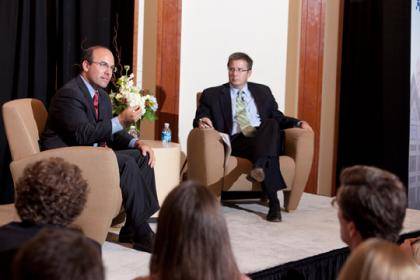
In the middle of Juan Zarate's keynote address Thursday night on national security following the 9/11 attacks, U.S. officials went public with a new terror threat. The news drove home one of Zarate's main points: "We have been lucky."
"We often forget, frankly how many plots and networks were disrupted in this time after 9/11," he said. There was "a sense that the next attack was coming tomorrow. I urge people to keep that in mind."
Zarate, a member of the Bush administration on 9/11, spoke to a crowd of nearly 200 people about the evolution of national security since the attacks.
He was interviewed by Peter Feaver, Duke political science professor and director of the Triangle Institute for Security Studies, who also served in the Bush White House, for the Terry Sanford Distinguished Lecture, "9/11: After a Decade and After Bin Laden."
The event, which was held in the Sanford School's Fleishman Commons, began the "Ten Years Later: Reflecting on 9/11" conference organized by several groups on the Duke, University of North Carolina at Chapel Hill and N.C. State campuses.
Feaver asked Zarate about the White House's immediate response to the attacks, the threats to civil liberties, anti-Muslim discrimination, the slow demise of the al-Qaeda network worldwide and the current state of national security.
Zarate said that popular uprisings this spring throughout North Africa and the Middle East offered some hope that al-Qaeda's ideology is being opposed morally, theologically and politically -- and that Americans can feel safe again. But he said that the uprisings added to regional instability that could aid the rise of other smaller violent groups. "We have to be conscious of what lies beyond al-Qaeda."
Zarate, who held a post in the Treasury Department on 9/11, said he was proud the department "had a seat at the [national security] table" in the days following 9/11 and was able to "actually go after and disrupt terrorist networks and isolate rogue financial activity. It built diplomatic ties and capacity around the world and became a model for other important national security issues."
He said he did not think that the government went too far in using other tools that many criticized as encroaching on civil liberties, saying that this was a new kind of war.
Zarate noted that President Obama has continued many of the Bush policies, including provisions of the Patriot Act and the heavily criticized Foreign Intelligence Surveillance Act which oversees eavesdropping on civilian activities. He praised Obama's "aggressive posture."
"We couldn't simply hope or wait, in terms of intelligence gathering," Zarate said. "That doesn't mean you throw away civil rights and civil liberties and the Constitution. We didn't do a good enough job getting Congressional buy-in and explaining what was being done and why. Things were misconstrued in terms of what rights were being infringed upon or not and that narrative became hard to deal with."
He also applauded the Obama administration for making the "gutsy" decision to give the Navy Seal unit the order to go after bin Laden, even with unclear information. But he also expressed concern about President Obama's attempt to close Guantanamo, which was blocked by congressional action, saying the administration faltered by trying to break from past policy.
Zarate offered some criticism of the Bush administration, too.
"I don't think we quite understood how we were going to settle Afghanistan," he said. "The timing is something we need to reflect on."
Several times he expressed regret that counterterrorism efforts helped fuel anti-Muslim discrimination in the United States. He said President Bush tried to symbolically articulate that America was at work against terrorism, not against Islam.
"The reality is that those attempts were undercut by perceptions, images and actions, such as declaring war in Iraq," Zarate said, adding that Abu Ghraib didn't help either. "There was a sense we were targeting Muslims. I was frustrated that we couldn't break through that narrative and burden of perceptions in the field. History will tell if the way Bush handled it served us well."
He said that al-Qaeda wins, "if we start to view each other as 'the other.' If Muslim Americans start not to feel American, that's disastrous."